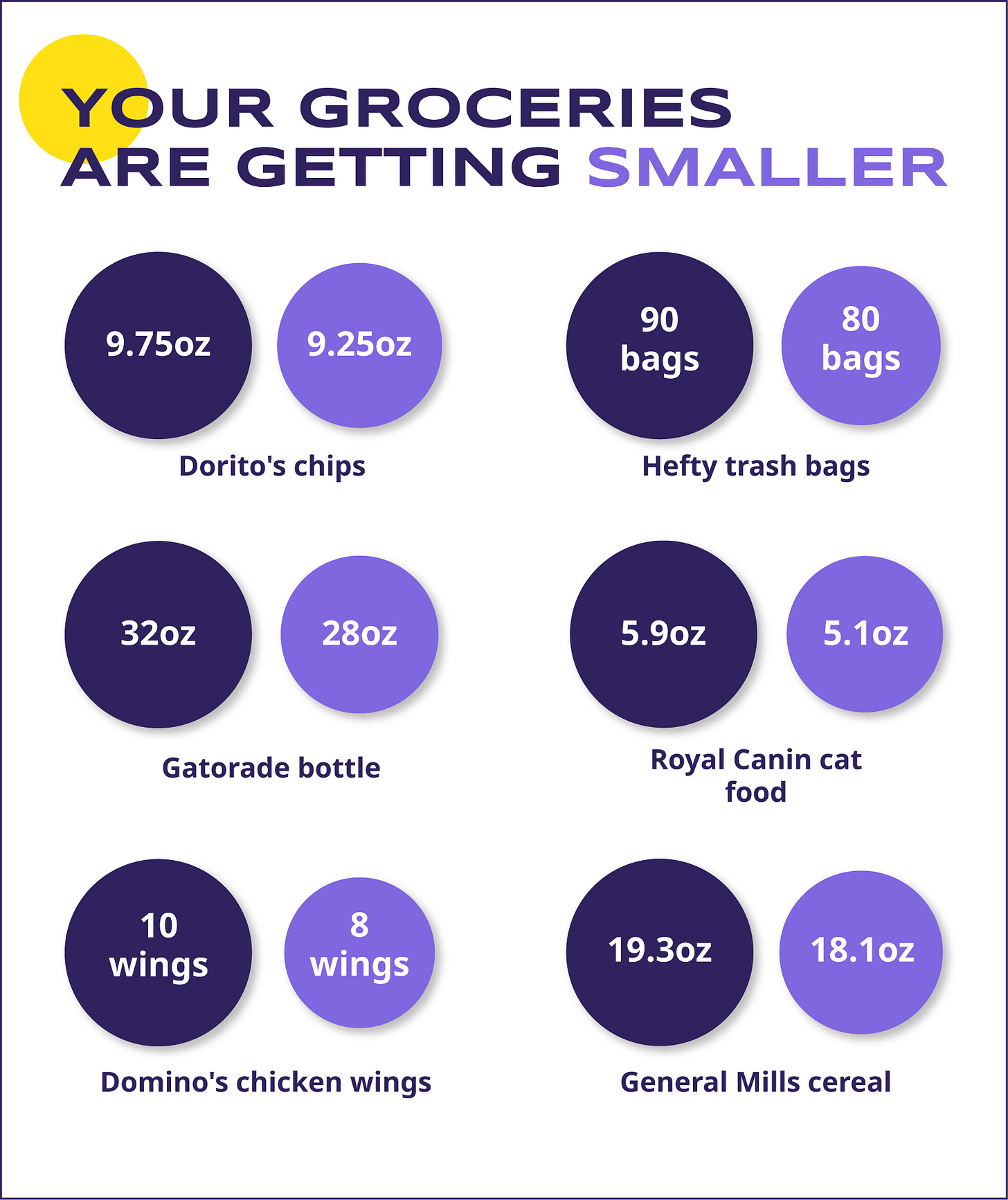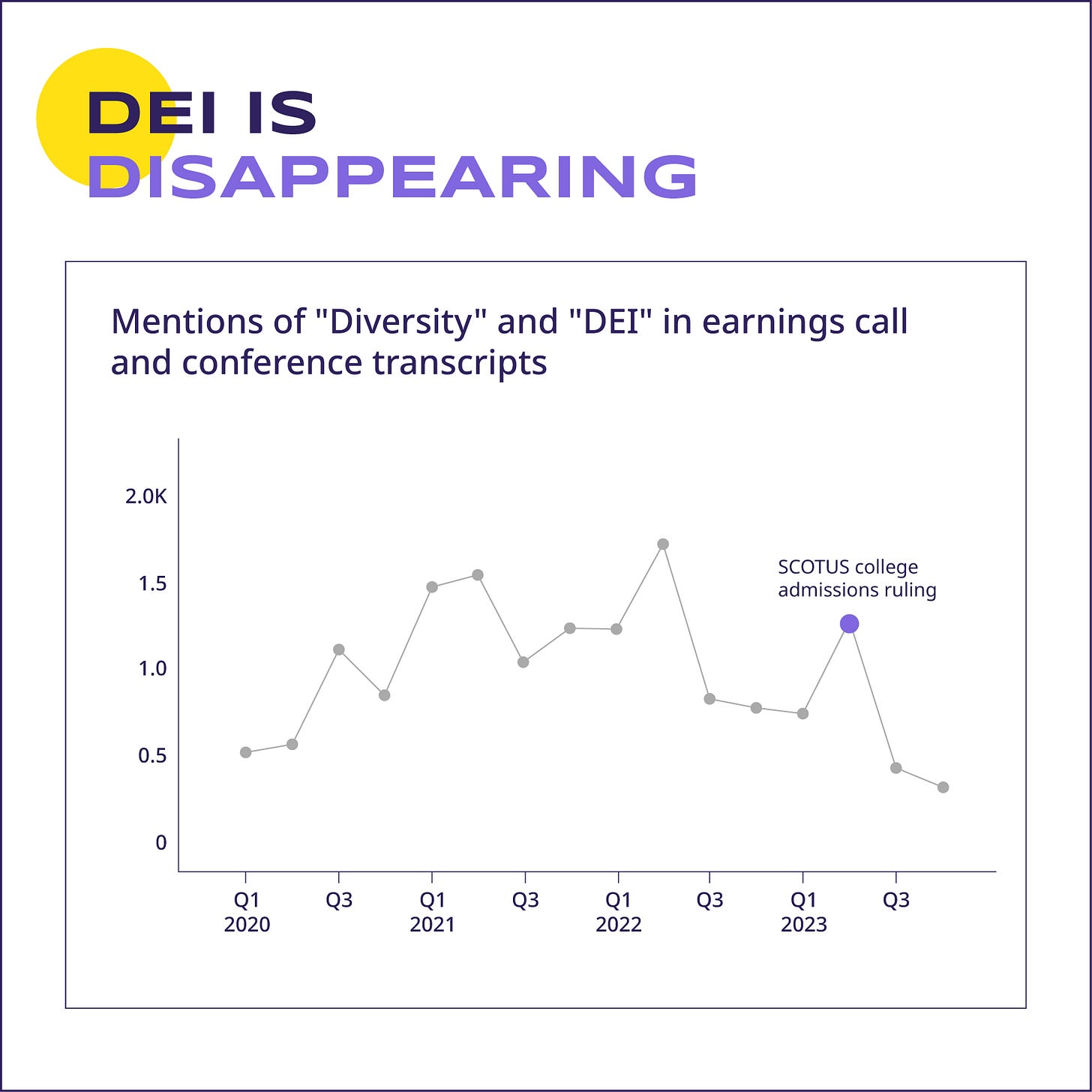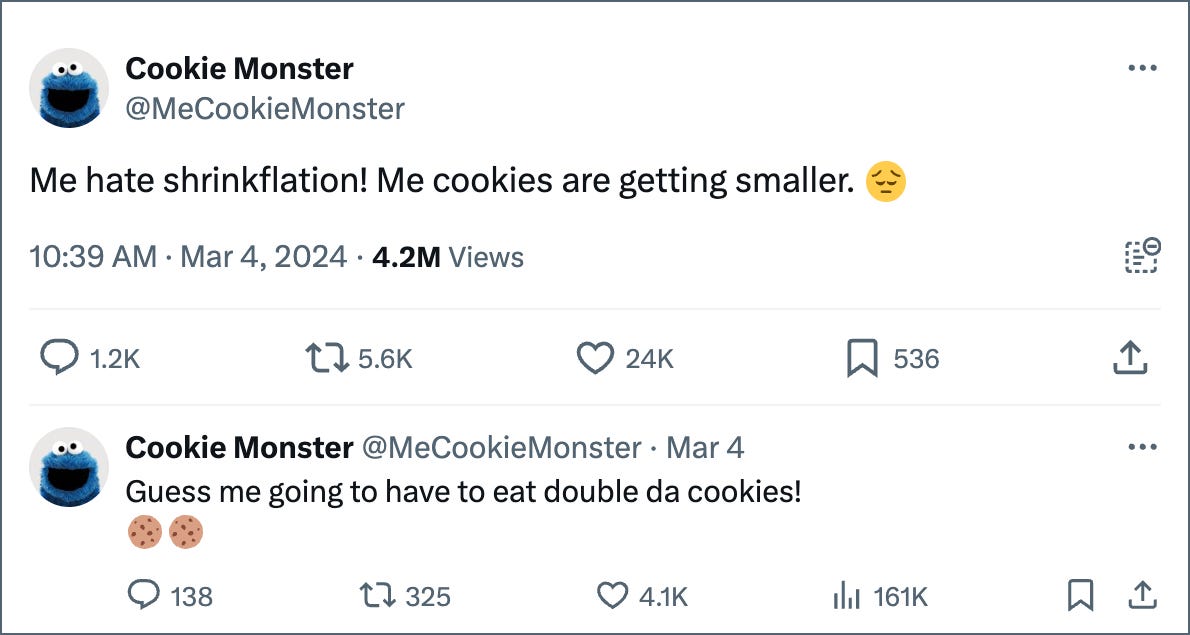What's Next, Now: March 2024
This month, our crystal ball predicts shrinking groceries, disappearing DEI commitments, a growing women’s health market, and more.
While talk of “inflation” has dominated the headlines over the past few months, its second cousin has rolled into town: shrinkflation. Shrinkflation describes the practice of companies selling their products in similar packaging, but with less weight, volume, or quantity — or, consumers are paying more for less.

Affecting everyone, even Cookie Monster, political figures are advocating for the “2024 Shrinkflation Prevention Act” to expand regulatory authority and allow the FTC to pursue civil actions against companies that engage in this practice. Data from the Federal Reserve shows that from 2020 to 2022, corporate profits rose by a whopping 75% — five times as fast as inflation.
Shrinkflation is one of the factors contributing to the current “vibecession” — the disconnect between the current state of the economy and consumers' feelings about it. While most measures of the economy continue to improve, things like shrinkflation, as well as rising prices at grocery stores and restaurants, are exacerbating consumers' anxieties.
And speaking of a disconnect, the CEO of Kellogg’s received some flack after recently suggesting that families with strained finances could cope by eating “cereal for dinner.”
As packaging shrinks and prices rise, consumers are feeling the pressure on their wallets. But so far, we’ve yet to see a brand step up as a consumer advocate, instead responding with strategies that help only with rising costs on their end (We’re looking at you, Wendy’s, and your now-defunct plans for dynamic menu pricing.) In the long run, brands must balance how to manage their P&Ls in the face of rising costs while keeping their consumers top of mind.
Stop us when you recognize this one: a big social movement catches on in the corporate world. Businesses invest significant time and money into it. Then, backlash against the movement starts to grow and companies slowly pull back on the commitments they had just made.
If you thought of ESG, you’re right. If you thought of DEI, you’re also right — the DEI movement is following in ESG’s footsteps as the next social program to see the tides turn against it.
Many businesses are beginning to pull back from the DEI commitments they made fewer than four years ago. Goldman Sachs and JP Morgan are expanding equity programs for Black college students to include white students as well. Zoom cut its entire internal DEI team. And Citizens Financial Group walked back on its goal of having women and people of color make up at least 50% of the candidates for senior-level roles.
More subtle changes also point to shifting corporate attitudes toward DEI — an investigation by Bloomberg found mentions of DEI in companies’ annual regulatory filings are starting to disappear. Out of 82 filings reviewed by Bloomberg last quarter, almost 20% either removed diversity language or substituted less controversial phrases.

This year will be particularly contentious for businesses balancing competing demands from consumers. It’s expected that brands will seek to avoid potentially controversial waters during an election, but abandoning prior commitments altogether might not be the right answer. Maintaining an intentional, authentic approach to DEI that remains true to brand values is key.
A flood of media coverage of technical failures on airplanes has painted a target on the back of airline manufacturers and regulators.
The increased scrutiny started earlier this year, when an emergency exit door blew off a 737 Max in the middle of an Alaska Airlines flight. Boeing, the plane’s manufacturer, now faces a lawsuit and a DOJ investigation for the incident (and the sudden death of an important whistleblower currently testifying against the company doesn’t help their case).
But that was just the beginning — a United flight bound for Osaka, Japan had to make an emergency landing after a wheel fell off during take off. Another United flight was diverted for a damaged wing. And in New Zealand, a technical failure caused a plane to drop suddenly in midair, injuring 50 passengers. For a battered industry already facing consumer ire for a recent plague of delays and cancellations and increasingly high fees, manufacturing defects and dangerous technical issues are just more logs on the fire.
Since this trend is still in its early stages, the airline industry hasn’t faced any loss of travelers — yet. But summer travel could be affected as airlines scramble for alternatives to the Boeing 737. United has said they are reconsidering ordering Boeing 737 planes in the future in an attempt to assuage customer concerns. If airlines want to keep the trust of fliers, ensuring their safety in the air should be first priority — not pushing increasing costs off onto consumers through higher bag fees.
Up until now, access to female contraceptive options has required a doctor’s appointment. But soon, women in the U.S. will be able to purchase over-the-counter birth control pills from Walgreens and CVS. This monumental advancement in women’s health comes as women’s healthcare enters mainstream conversations.
Women’s health initiatives have long been underfunded, and their health issues even flat-out ignored — but that is changing. Although venture funding fell 27% between 2022 and 2023, investments in innovators focused on women’s health grew 5% — a difference of 32 percentage points.
Revolutions in women’s health are happening around more taboo topics as well, such as menopause. A 2023 study of post-menopausal women found that almost none of the respondents learned about menopause in school, and half of them “did not feel informed at all” before entering this life stage. But now, menopause is becoming a hot topic in healthcare conversations.
Various medications and companies have surfaced in the past year focused on treating symptoms caused by menopause including mood swings, hot flashes, dry skin, and changes in libido. Alloy, for example, connects patients to menopause specialists and sells wellness products that aim to ease symptoms. Veozah, a medication that treats menopausal hot flashes, even had a prominent ad spot in the 2024 Superbowl, and Bayer is currently developing a similar medication.
With increased investment comes innovation. The women’s health industry represents a previously untapped market for innovation and meaningful change. As more women open up about their health issues and demand better care and access to quality medications, healthcare infrastructure is following suit. During the State of the Union address, President Biden pushed for a $12 billion research initiative on women’s health. While that initiative is still in its infancy, women’s health topics are poised to continue breaking into the mainstream as barriers to innovation are knocked down.
Social media sites are experimenting with a new revenue source: selling data for AI training. Reddit signed a deal with Google to allow its AI platform to train on Reddit’s vast library of content, while Automattic, the parent company of Tumblr and Wordpress, is selling user data to OpenAI.
SEO specialists, this one’s for you: Google announced it’s finally trying to get a handle on AI clickbait and is updating its search algorithm to filter out AI-generated spam.
Industries from CPG to plus-size clothing and gyms are feeling the burn of the Ozempic craze.
After threatening multiple times to ban everyone’s favorite time suck, the U.S. House of Representatives finally passed a bill that would either force TikTok parent company ByteDance to divest from the app in the States or ban it completely from app stores. Now the Senate will decide its final fate.
Want to hear more? Check out our free newsletter The Spark for the biggest digital marketing updates, tips, and trends in your inbox. From SEO to social media to content marketing, we’ve got you covered.
Copyright © 2024 Tier One Partners is a women-owned full-service PR, content, and digital marketing agency. We work with innovators in B2B and B2C technology, digital healthcare, financial services, energy tech, and manufacturing to develop award-winning creative, data-driven strategies that propel them to industry leader status. From day one, we’re committed to earning our clients’ trust, sharing their vision, and embedding their purpose into everything we do. To learn more, visit wearetierone.com.














